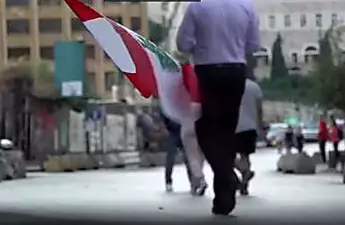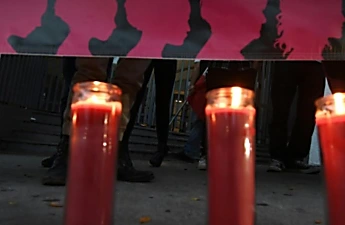Issued on:

ADVERTISING
Beirut
Fearing food shortages in protest-hit Lebanon, Sanaa crammed bags of fava beans into a packed trolley, one of dozens of shoppers who rushed to buy basic supplies in a Beirut department store.
"I don't remember ever stocking up on so much food," said the 40-year-old woman. "We are preparing for the coming days and the murky phase awaiting us."
Around Sanaa, a civil servant who asked to use a pseudonym, shoppers swarmed the meat refrigerators and vegetable stalls, mostly ignoring the alcohol and sweets aisles to focus on essential food products.
Lebanon has been gripped by an unprecedented wave of grassroots protests since mid-October, with citizens demanding an overhaul of a political class deemed incompetent and corrupt.
Across the country, supermarkets have been hit by panic-buying amid rumours of an upcoming shortage in food staples and additional price hikes.
Fears were deepened by warnings from petrol station owners and hospitals of a shortage of fuel and medicine after banks limited access to the dollars they needed to pay for supplies.
Standing beside a row of canned food, Antoine Dirani said the restrictive bank measures were causing panic, driving people to withdraw money from their accounts and stock up on supplies.
"We are now living in the heart of the crisis," he said.
Looking around him, the 63-year-old recalled Lebanon's 1975-1990 civil war and said: "I hope such days won't come back.
"I remember how we used to stand in line and beg for bread."
- Bank restrictions -
Demonstrators have targeted banks and state institutions, demanding better living conditions in a country they say has become unaffordable for ordinary people.
For two decades, the Lebanese pound has been pegged to the greenback, with the currencies used interchangeably in daily life.
But banks have been reducing access to dollars since the end of the summer, following fears of a shortage in central bank reserves.
Access was further limited days ago after banks reopened for the first time since the unprecedented popular uprising began on October 17.
They have halted all ATM withdrawals in dollars and severely restricted conversions from Lebanese pounds.
This has forced people to change money on the black market where they are charged higher exchange rates, in what amounts to a de-facto devaluation of the pound.
The official exchange rate remains fixed at 1,507 Lebanese pounds to the dollar, but the rate on the parallel market has passed 1,800, leading to price hikes.
- 'Scared of shortage' -
Zouhair Berro, head of the Lebanese Consumers Association, said the price of meat had increased seven per cent and vegetables by more than 25 per cent in the past week.
"Prices are all over the place," mainly because suppliers and importers are imposing their own arbitrary exchange rates, he said.
Back in the department store, long queues formed at checkouts and employees said they were working longer hours to meet demand.
"Business is busier than usual. It's as busy as the holidays," said Eireen Saif. "This is all because people are scared of a shortage."
One shopper, who asked not to be named, voiced worries about the excessive buying, saying that "all this food people are buying will spoil before it is consumed."







![[Pics] Embarrassing Costume Mistakes You Never Noticed [Pics] Embarrassing Costume Mistakes You Never Noticed](https://images.outbrainimg.com/transform/v3/eyJpdSI6IjE2MzI3ODJlY2U4YjFmN2IwZWViNzYxZTBkMTIzNmE0MmQxZTM3NDVmMTRhMDA0YjNlNTc2YjNkNmY0NmYxZWUiLCJ3IjoyMzAsImgiOjE1MCwiZCI6MS41LCJjcyI6MCwiZiI6NH0.webp)
No comments:
Post a Comment